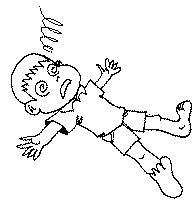FADE TO BLACK... by Ken Keckler DVM
- posted: Jul. 07, 2014
FADE TO BLACK...(Originally published 8/22/10)
It can happen to anyone. Big, burly men and petite, tiny women (and anyone in between) can be susceptible. Many people are prone to it (pun intended.) It can start fairly slowly… First you may hear a slight buzz or hum, maybe your vision gets fuzzy, or you see white spots. Some people get very warm, some feel clammy; but unless you sit down and get your head between your knees, the end result is… PASSING OUT.

I joke about it frequently with clients when in a bloody or potentially gruesome situation, usually to see how they respond to the idea. A nervous laugh or story of a prior episode gives me an indication that I might not want to rely on them to hold the horse in question while I work on it.
Many years ago at a nice stable, I was doing preventative medicine on a big chestnut warm blood gelding, owned by a young high school girl. Her mother (who was always very involved in whatever issues we were dealing with) reminded me that this young lady had passed out once during her horse’s treatment. The three of us had a small laugh at the memory, (although the girl blushed), and I continued to treat the horse. I had already done an exam, given a vaccine, and was preparing to tubeworm him. The mother held the patient, and we were standing in the stall, with the girl leaning in the doorway, watching. The horse stood like a champ as I passed the tube up the nose; he swallowed and I pushed the tube gently down his esophagus toward his stomach. No drama, no problem. I attached the can with the dewormer, allowed gravity to take it into his stomach, and began to withdraw the tube. Part of the way out, a small trickle of blood ran out of the nostril under the tube. I looked up just in time to see the girl’s body curling inward around the door post, falling past the water bucket on the wall, to land at my feet in the sawdust. (We have a winner, and it’s: Gravity!) Her horse never moved. Maybe he was used to this! Apparently the sight of blood (even a trickle) was enough to send her into la-la land. As we brushed the sawdust from her face, she quickly recovered and was fine, although I think she was embarrassed. If not, her mother had a new story to embarrass her with later. Thanks Mom!

Frequently we take students who are interested in veterinary medicine as “shadows”. One particular female high school student was very nice and personable, but I got a vibe from her that she really wasn’t into it. We responded to a call at Chagrin Valley Farms for a laceration. After we set out the things I’d need, the horse was cross-tied in the aisle. I clipped and scrubbed the very small, simple, horizontal laceration (about one inch- this was a tiny cut) on the left forearm. The student stood to the left of the horse’s head, observing. I drew up lidocaine, and began to block the margins of the wound with a small needle. Apparently, needles were not her strong suit. Out of the corner of my eye I saw her fall backwards towards the stalls and heard a horrendous “CRACK” as her head hit one of the 2 x 4s that cross the door front. The horse freaked, pulling back on the crossties until they broke, flinging my hard to find, glass cold sterile tray to the concrete, where it shattered and sent instruments flying. The flight response was complete as he turned to run down the aisle toward the several other horses in crossties, dragging his own crossties with him. I must have looked like a cartoon character with my head on a swivel looking first toward the unconscious girl, then at the potential disaster down the aisle, then back at the girl. Easy decision: help the poor girl first. I went to her side, and said her name several times before the eyelids fluttered and she came around. Kind of. I had her lay quietly where she fell while I recovered the horse. No one else was injured, thank God! My cold sterile tray, on the other hand, was annihilated.
Getting ice for the goose egg on her head, and having her sit still for a while, I still wasn’t comfortable with her injury. Her expression was a little more dazed than it should have been. (Spending an entire day with me can lead to a dazed expression. Just ask Pete.) She refused to let me take her to the emergency room, so I called her mother, explained the situation, and let mom make the call. It was decided that we would finish the day’s work, and the young lady’s mother would take her for an exam that evening. She sat quietly in the air-conditioned truck for the next two farm calls, and then I took her home. (Her mother did take her to the ER, and she was pronounced “normal”. Thanks Mom!)
More recently, Pete and I were treating a “tied up” horse by running into him some IV fluids with DMSO. DMSO has amazing ability to cross membranes, and when given IV, the animal will exhale the odor very quickly. It smells, they say, like garlic. Kind of. Huge crushed cloves of mutated, extra-pungent garlic. (I love garlic, and DMSO is not quite the same smell). The trainer’s teenage daughter was holding the lead and watching, Pete was manning the bag of fluids, and I was… somehow in the right place: catching the young lady as she wobbled, staggered, and fell backwards, spooking the horse. I caught her before she hit the floor, and luckily, Pete caught the horse’s halter, and didn’t even lose the catheter! After sitting on the cool concrete floor with her head between her knees for a few minutes, she found her way back to planet earth. Apparently, the potent smell of DMSO made her drift away. I wouldn’t want to be at their house on “Italian Night”!
I am not immune to the loss of consciousness either. I was in junior high school and spending the day with my veterinarian, Dr. Phil Fields. Dr. Fields was a big man, with a big laugh and a mixed animal practice. He was probably 6’5”, with a large belly and a heck of a limp from an old ankle injury. As a freshman at Ohio State, he had played basketball with John Havlicek and Jerry Lucas. He had always done the vet work on all of our animals, and had a profound influence on my desire to be a veterinarian.
A 60 pound male mixed breed dog had a 3 cm diameter round mass in his perineum (OK, let me spell it out: right below his butt) and Dr. Fields was doing surgery to remove it. With the dog under general anesthesia, he had used a scalpel to incise through the skin and down into the muscle layer, leaving a round “crater”. I was fine with that. To stop the bleeding of several small blood vessels, Dr. Fields was using electro-cautery. This is an instrument that emits a small pulse of electricity when touched to a surface and a pedal is pressed. As I watched, the tip of the cautery zapped the bleeding veins, sending up a puff of smoke and the smell of burning flesh. (Much like the smell of a “hot set” shoe, burnt on the hoof). Every time the electricity hit the flesh, a reflex occurred: the sphincter muscles of the anus would spasm and constrict. “Twitch”, if you will.
Zap, anal twitch, smoke, awful smell, aaaaand… repeat. Zap, anal twitch, smoke, awful smell, aaaand … repeat. Zap, anal twitch, smoke, awful smell, aaaand… sounds are beginning to seem like they are coming from far away, but a buzzing sound is increasing in volume… “snow” is developing across my vision… it seems to correlate with the louder buzzing… did someone turn up the air conditioning? because I’m breaking out in a cold sweat.
Dr. Fields looked up at me and said (from far away) “You look a little green. Maybe you should go sit down in the waiting room for a while.” I staggered to the front of the office, fell into one of the soft, vinyl covered chairs, and waited there, embarrassed, until the buzzing went away, the blizzard left my vision, and I could stand up without the room slanting to one side. To his credit, Dr. Fields never made a big deal about the episode, although he and his secretary gave me some (good natured) grief about it later.
So, If you’re thinking of being a veterinarian (or just playing one on TV), don’t get discouraged if you’ve had a fuzzy moment or two: it happens to (almost) everyone. If passing out seems to be a habit, or you consistently get queasy at the sight of blood, needles, or maggots, maybe veterinary medicine isn’t your calling (or, you should wear a helmet. Who knows, you might start a fashion trend!)
Location
Find us on the map
16295 Claridon Troy Road
Burton, OH 44021, US
Office Hours
24 Hour Emergency Care - 365 Days a Year
8:00 am - 4:30 pm
8:00 am - 4:30 pm
8:00 am - 4:30 pm
8:00 am - 4:30 pm
8:00 am - 4:30 pm
Emergencies Only
Emergencies Only


